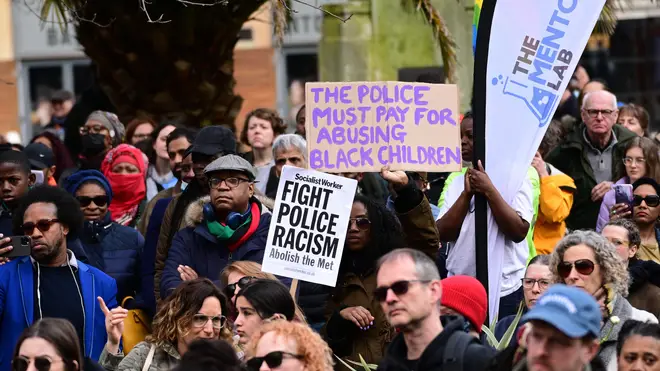
Ali Miraj 6pm - 9pm
8 August 2022, 10:43

More than 600 children were subjected to "traumatising" and "intrusive" strip-searches by the Metropolitan Police over a two-year period, with black boys disproportionately targeted, new data shows.
In almost a quarter (23%) of cases, strip-searches took place without an "appropriate adult" confirmed to have been present.
This is required by law, except in cases of "urgency", and usually is a parent or guardian, but can also be a social worker, carer or a volunteer.
Two thirds of these (70%) involved black boys.
The "shocking" figures show that 650 10-17-year-olds were strip-searched by Met officers between 2018 and 2020, according to data obtained from Scotland Yard by the Children's Commissioner.
Of these children, 58% were described by the officer as being black, and more than 95% were boys.
The Children's Commissioner, Dame Rachel de Souza, requested the figures after the Child Q scandal came to light in March.
Read more: Met strip-search five children every week without first arresting them, LBC reveals

LBC exclusive report on the Met's strip searches on children
The 15-year-old schoolgirl was strip-searched by police while on her period - and without an appropriate adult present - after being wrongly suspected of carrying cannabis at school.
A review conducted by City & Hackney Safeguarding Children Partnership (CHSCP) concluded the strip-search should never have happened, was unjustified and racism "was likely to have been an influencing factor".
Four officers are being investigated in connection with the incident.
Dame Rachel said she is "deeply shocked" by the figures, which show that a significant number of children "are being subjected to this intrusive and traumatising practice each year".
She is also "extremely concerned" at the ethnic disproportionality they reveal, with ethnicity identified as a key factor in Child Q's ordeal.
Read more: Revealed: Most children strip-searched by Met come from ethnic backgrounds

Sadiq Khan responds to data on Met Police strip searching children
She said: "I am not reassured that what happened to Child Q was an isolated issue, but instead believe it may be a particularly concerning example of a more systemic problem around child protection within the Metropolitan Police.
"I remain unconvinced that the Metropolitan Police is consistently considering children's welfare and wellbeing."
Dame Rachel said she has submitted the data to Baroness Louise Casey, who is carrying out a review into standards at the Met.
The Children's Commissioner's team will request comparable data from all police forces across England.
A Metropolitan Police spokesman said: "The Metropolitan Police is progressing at pace work to ensure children subject to intrusive searches are dealt with appropriately and respectfully. We recognise the significant impact such searches can have.
"We have already made changes and continue to work hard to balance the policing need for this type of search with the considerable impact it can have on young people.

Former Met Police officer on the effect strip searching has on children
"We have ensured our officers and staff have a refreshed understanding of the policy for conducting a 'further search', particularly around the requirement for an appropriate adult to be present. We have also given officers advice around dealing with schools, ensuring that children are treated as children and considering safeguarding for those under 18.
"More widely we have reviewed the policy for 'further searches' for those aged under 18. This is to assure ourselves the policy is appropriate and also that it recognises the fact a child in these circumstances may well be a vulnerable victim of exploitation by others involved in gangs, county lines and drug dealing."